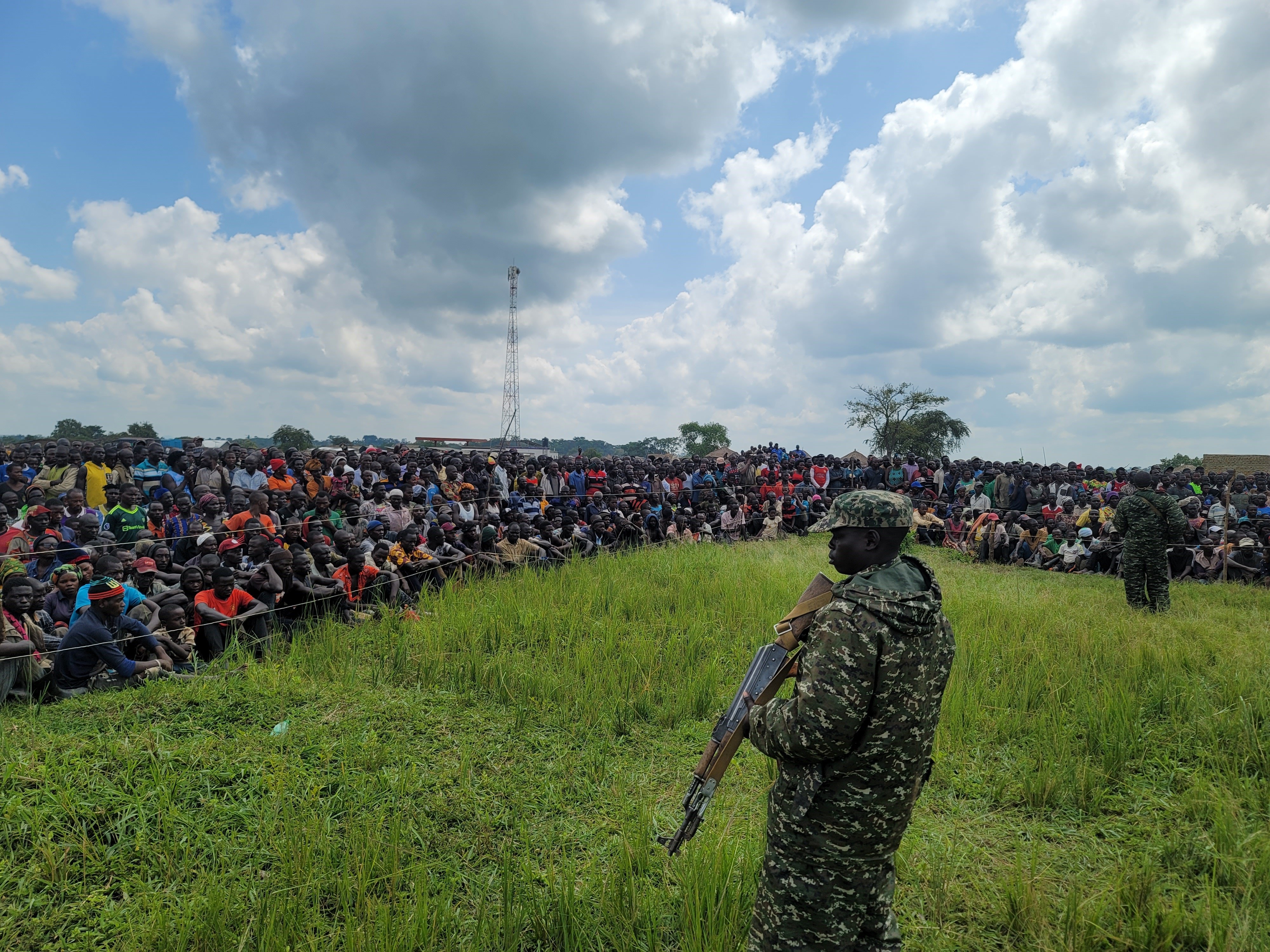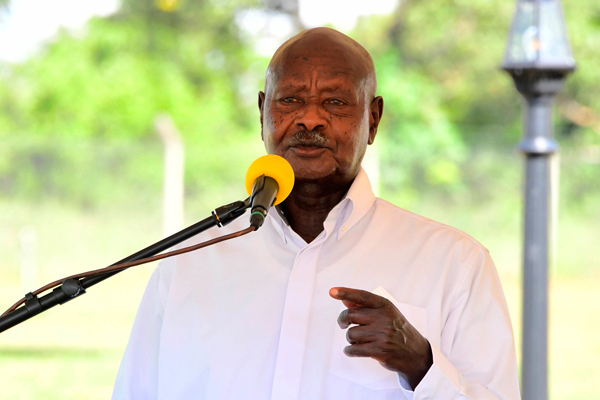WATCH: UPDF to evict 40,000 settlers on Apaa land

UPDF soldiers stand guard during a meeting between the army and the community at Apaa Primary School, in Zoka C Centre in Itirikwa Sub-county, Adjumani District on December 5, 2023. PHOTO/TOBBIAS JOLLY OWINY
What you need to know:
- In August 2018, after 234 residents of Apaa sought safety at the UN Office of the High Commissioner for Human Rights in Gulu, Mr Museveni formed a committee to resolve the conflict. But when the committee announced a plan to relocate all residents and compensate 340 households, the community declined the offer, which would have compensated only a small percentage of residents and for only a fraction of their loss and harm.
- Late last month, the Chief of Defence Forces (CDF), Gen Wilson Mbadi, rushed to Apaa to assess the situation.
The Uganda People’s Defence Forces (UPDF) have ordered at least 40,000 illegal settlers to vacate contested land in Apaa following fresh tribal clashes that broke out last week in the area.
On Tuesday, Brig Michael Kabango, the UPDF 4th Division commander, told thousands of locals at Zoka C Centre in Adjumani District that those who illegally settled inside the contested area between 2014 and 2023, will be forcibly evicted by the army.
He cited the rising tension and depletion of the environment (tree cover) due to commercial charcoal production.
“We (the army) are going to make sure everybody who entered the forest and game reserves after 2014 leaves immediately... It is safer for you to leave. Those who are all over the place (Apaa) doing that business are not local Acholi or Madi, they are foreigners,” Brig Kabango said.
He added: “For those places where people entered before 2014, we are not going to interfere, but those who are there within the period I explained, please start moving, get out because we are going to remove you.”
Brig Kabango said their latest investigation revealed that thousands of people recently settled inside the contested area and have continued to carry out illegal logging and commercial charcoal production.
“We are saying the population has significantly increased in the past four months. Numbers grew from 40,000 to more than 80,000, and that is putting a lot of pressure on the available forest and game reserve, so go back to where you came from,” he said.
The land has been claimed by Adjumani and Amuru districts, and the Uganda Wildlife Authority (UWA).
The eviction comes ahead of the commencement of activities of a commission of inquiry into the Apaa land conflict chaired by former Chief JusticeBart Katureebe.
In April 2023, President Museveni appointed the Commission to conduct an inquiry and solve the conflict in Apaa between the UWA, Acholi and the Madi communities in Amuru and Adjumani districts.
Mr Proper Turyatemba, the proprietor of Prona Farmers Ltd, who is carrying out commercial grain growing in Apaa asked the army to give them a 40-day grace period to allow them harvest their produce.
“I have 400 acres of maize that is beginning to dry for harvest. Just like hundreds of other farmers who are growing different types of crops, give us 40 days to harvest our crops and we will leave,” Mr Turyatemba implored the army.
But Brig Kabango insisted that the encroachers have become a security threat in the area.
“For security reasons, you are a problem because you are interfering in a conflict. Since the conflict started, the attackers have not killed any foreigners. The Acholi and the Madi communities clashed and killed each other but now they are targeting foreigners, it is not accidental, it is deliberate.”
While Brig Kabango did not give a definite timeline for those settled within Apaa Trading Centre (outside the conflicted area) and engaging in charcoal business and farming to leave the areas, he said those who settled in the contested area (game reserve and forest reserve) will be evicted with immediate effect.
He also said the army would not spare opportunists and illegal charcoal dealers marauding in the area since they are disobeying President Museveni’s order, which outlawed commercial charcoal burning.
Brig Kabango added: “We have an executive order against charcoal, wood and timber products, anywhere we find them in Apaa, we are going to destroy them.”
To enforce the eviction, Brig Kabango said they built a team of 20 leaders from the Madi and Acholi communities to enable proper identification and verification of encroachers who have settled in the area since 2014.
Clashes
Meanwhile, at least 10,000 people living within the contested Apaa area have been displaced following fresh clashes that broke out in the area in the past week that left three people dead.
Those killed include Amos Byaruhanga, Richard Kabasa and another victim only identified as Francis, who were burnt to death on December 9 in their grass-thatched houses by attackers suspected to be from the Madi community of Adjumani District. More than 100 grass-thatched houses have been burnt by the attackers.
Late last month, the Chief of Defence Forces (CDF), Gen Wilson Mbadi, rushed to Apaa to assess the situation.
Speaking to locals, Gen Mbadi said: “We need to address the root causes to ensure peace for the communities.”
During the meeting, the chairperson of Acholi Parliamentary Group, (Kilak North MP Anthony Akol), applauded the move by the army to evict the encroachers, saying their presence in the area would mislead the commission of inquiry into making wrongful conclusions.
He said: “The non-natives have to leave, it is not until the land conflict is resolved that they can come back. The presence of these foreigners here will mislead the Commission to think the inhabitants of the area are foreigners who recently intruded the area and are not the indigenous people.”
Mr Akol also asked security agencies to release nine locals who were arrested and have not been produced in court for more than four months.
Probes on apaa land
In August 2018, after 234 residents of Apaa sought safety at the UN Office of the High Commissioner for Human Rights in Gulu, Mr Museveni formed a committee to resolve the conflict. But when the committee announced a plan to relocate all residents and compensate 340 households, the community declined the offer, which would have compensated only a small percentage of residents and for only a fraction of their loss and harm.
Days later, Mr Museveni created another committee to look into the matter, but residents reported continued attacks, forced evictions and other violations. In August this year, retired chief justice Bart Katureebe was sworn in as the chairperson of a five-member Commission of Inquiry to investigate the causes of the Apaa land conflict in northern Uganda.




